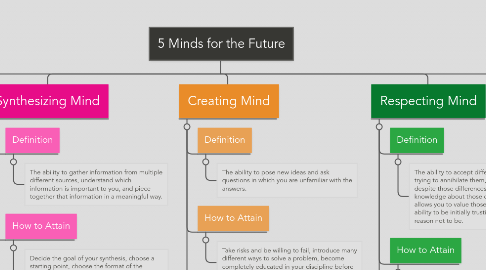
1. Synthesizing Mind
1.1. Definition
1.1.1. The ability to gather information from multiple different sources, understand which information is important to you, and piece together that information in a meaningful way.
1.2. How to Attain
1.2.1. Decide the goal of your synthesis, choose a starting point, choose the format of the ultimate synthesis, begin synthesizing and continue to edit until you are content with the results and your understanding of the results is deep.
1.3. Example
1.3.1. A newly recruited turnaround executive needs to synthesize information in order to determine where her company went wrong and to devise a plan of action. She must create an extensive plan and take her time in order to accomplish her goal and to evaluate information that pertains to her level of understanding.
2. Respecting Mind
2.1. Definition
2.1.1. The ability to accept differences instead of trying to annihilate them, learning to live despite those differences, and then acquiring knowledge about those differences which allows you to value those differences. The ability to be initially trusting unless given a reason not to be.
2.2. How to Attain
2.2.1. Model respectful behavior, become educated about other cultures. Debunk intolerance and prejudice, usually the best way to do this is through education.
2.3. Example
2.3.1. A white-majority classroom reading and discussing with sympathy books by and about black individuals.
3. Disciplined Mind
3.1. Definition
3.1.1. The ability to think within your specific discipline/profession, not just rote memorization. More about the learning process within a discipline and the meaning behind that process rather than the content itself.
3.2. How to Attain
3.2.1. Identify the important topics within the discipline you intend to master. Spend lots of time studying those essential concepts of a discipline deeply. Tackle these concepts from different angles.
3.3. Example
3.3.1. Students studying physics think of physics itself in terms of specific objects, rather than operating in the same manner on all objects. If a student is asked if a shoe or a brick will fall to the ground quicker, he or she would probably answer the brick because he or she has memorized formulas rather than the general laws that make up physics.
4. Creating Mind
4.1. Definition
4.1.1. The ability to pose new ideas and ask questions in which you are unfamiliar with the answers.
4.2. How to Attain
4.2.1. Take risks and be willing to fail, introduce many different ways to solve a problem, become completely educated in your discipline before you can really be creative.
4.3. Example
4.3.1. A salesperson experiences a dip in her sales. She is not discouraged because of this plummet, instead she wants to determine if it is a big deal and find ways to get herself out of this dip.
5. Ethical Mind
5.1. Definition
5.1.1. Striving towards effective work and positive citizenship.
5.2. How to Attain
5.2.1. Reflect on the roles you take on as a person (student, mom, teacher, etc.) and then attempting to fill those roles appropriately and responsibly.
5.3. Example
5.3.1. Knowing the core values of your professional position and carrying out those core values as well as passing them on to fellow coworkers.
